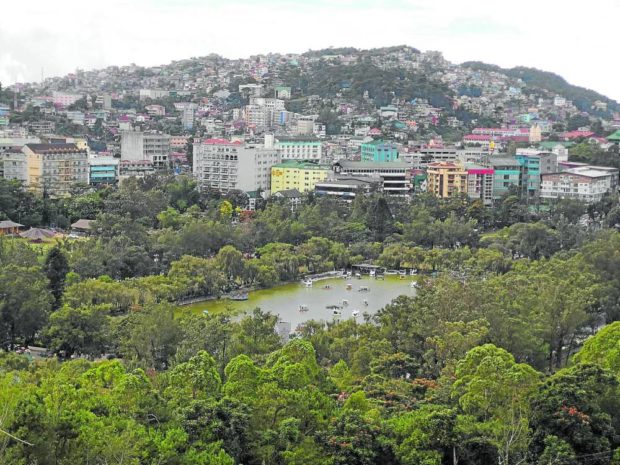
HEALTH SITUATION Baguio City, one of the country’s top tourist destinations, is dealing with a surge in COVID-19 cases, posting the highest average daily attack rate of 161.90, or the number of people infected per 100,000 population, on Jan. 23. The summer capital is among the seven cities outside Metro Manila which recorded the highest number of new infections that day. —EV ESPIRITU
BAGUIO CITY, Philippines —While the national government has encouraged local officials to limit the movement of unvaccinated people to control the spread of COVID-19, a councilor here wants residents who have yet to get inoculated to be shielded from discrimination, ridicule and contempt.
A proposed ordinance sponsored by Councilor Mylene Yaranon was discussed by the council on Monday after Baguio achieved its self-imposed target of fully inoculating 269,557, or 96 percent of its eligible 281,000 population. Only 5 percent (about 11,000) of them still require the shots or are awaiting to complete their two-dose regimen.
“It shall be unlawful to discriminate against a vaccine-free resident (the measure’s term for unvaccinated individuals) or coerce him or her to get vaccinated,” Yaranon said in the proposed ordinance.
The measure would allow unvaccinated residents to “buy essential goods and access essential services [and] be allowed on public transport.” Workers, who have not received their jabs, must periodically test for COVID-19.
Exemptions
But it said these residents would be exempted from this requirement if they could present a medical certification indicating that the vaccine could affect their medical conditions, or a certificate indicating membership in a religious organization that explicitly forbade vaccination. Workers awaiting their second dose should also be exempted from two-week mandatory tests, according to the proposal. “Everyone should be entitled to protection from all forms of discrimination,” Yaranon said.
Baguio enforces an antidiscrimination policy (Ordinance No. 13 series of 2017) that cracks down on public or private forms of harassment and unequal treatment at schools or the workplace on the basis of religion, ethnicity, sexual orientation, disability and their health status.
The proposed ordinance also requires Baguio to label vaccines according to the rate of efficacy when these are offered for free to residents, and to report adverse or side effects to the public.
Saying the city government needs to pursue a more ethical program to combat COVID-19, Yaranon told the Inquirer on Tuesday that the city’s medical strategy should now shift to boosting residents’ immunity.
Deaths
Yaranon cited what she perceived as a recent trend where many fatalities from Jan. 1 to Jan. 23 turned out to be people who had been vaccinated.
But this merely reflected the fact that more residents have been inoculated, and these deaths occurred because of underlying medical conditions aggravated by COVID-19, said Dr. Rowena Galpo, city health services officer, during the council’s session.
Galpo said vaccination remained as the city’s primary defense against COVID-19 in light of a wave of infections that might have been strengthened by the highly contagious Omicron variant.
Active cases
As of Monday, the city recorded 3,594 active cases out of the total 38,045 infected with COVID-19 since the pandemic struck in 2020. It recorded 756 deaths.
“My motivation is to save lives and [show people] if vaccines are effective or not—and if not, why? Should we be doing more booster shots? Should we include 5-year-old children [in the vaccination rollout]?” Yaranon said at the session.

